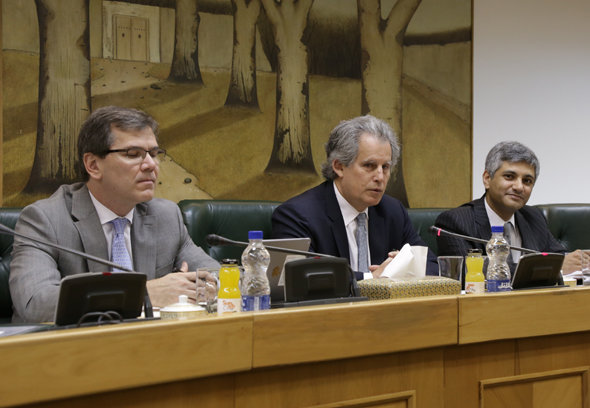Opportunity for Iran to deepen integration into global economy is coming: IMF

David Lipton, the first deputy managing director of the International Monetary Fund says the opportunity for Iran to deepen integration into global economy is coming.
The IMF published the full text of Lipton’s planned speech in Tehran on its website on Tuesday. Parts of the speech cover issues relating to the situation of the Iranian economy before and after the lifting of sanctions, opportunities and challenges ahead for its reintegration into the global economy.
Excerpts of the IMF official’s quotations are as follow:
With important sanctions lifted, Iran has a new opportunity to deepen its integration into the global economy. That process has the potential over time to support faster growth and rising living standards for Iranians.
But positive results depend on overcoming two major obstacles as well. The first is navigating a difficult global economic situation. And the second is building a competitive and flexible domestic economy that will serve as a suitably strong platform for growth.
The outlook for the Iranian economy
I suggest that while Iran will gain from pursuing integration with the global economy, your ultimate success depends on what you do at home: strengthening macroeconomic policies in the short run and forging ahead now with deep structural reforms for the long run. It is time for a plan of action on the economy.
Iran has already taken important measures to secure macroeconomic stability, including an important decline in the rate of inflation. That was done despite an episode of increased costs of trade and financial transactions, and limited access to foreign exchange assets that caused inflation to jump and the rial to depreciate significantly. That achievement will serve Iran well as its implementation the Joint Comprehensive Plan of Action continues.
With the oil sector regaining access to export markets, with businesses and banks facing lower transaction costs as they reintegrate into global trade and financial systems, both the oil and non-oil economy will gain.
But the global economy poses challenges that could eat into those gains.
To sustain the recent success in the battle against inflation, liquidity growth needs to be contained. This can anchor inflation in single digits, reduce potential pressure on the exchange rate, and help maintain the competitiveness of the non-oil sector. In addition, Iran’s commitment to exchange rate unification will be critical to entrenching economic stability.
• The banking system needs to be able to effectively channel credit to the private sector. This will require addressing the high levels of nonperforming loans, bolstering bank capital, restructuring weak institutions, dealing with unlicensed financial institutions, and strengthening risk management systems and bank supervision.
• And fiscal policy also has an important role to play. Iran’s fiscal policy would be most effective by focusing on a gradual reduction of the non-oil deficit. But instead of cutting spending, it might be better to mobilize more non-oil tax revenue. That would create space for increased public investment in infrastructure and human capital.
Structural reform, a crucial element
We have highlighted structural reforms for all countries as a crucial element in the quest to boost growth and create jobs. Some of these structural reforms would likely benefit Iran. They are, in essence, built around the principles of liberalization and privatization.
• Opening up product and services markets can be particularly effective because they bring short-term gains. They can spur more competition, and increase integration with the world economy. They can help create high-quality jobs for the younger generation of Iranians.
• Labor market reforms can be particularly effective in drawing people into the workforce. This approach could be considered in Iran, where unemployment remains high, and demographic pressures will continue to bring large numbers of new entrants to the labor market in the coming years. But it is important that some measures—tax cuts and training programs—that have fiscal implications are able to fit within the broad fiscal framework.
• Another area of structural reform is the policy mix that can help to foster innovation. This can be achieved by removing barriers to competition and foreign investment, reducing the hold of monopolies and special interests, cutting red tape, and increasing investment in education and research. Countries are finding that increased openness to foreign investment can facilitate technology transfers and enhance access to foreign markets. They are trying to reduce the cost of doing business, address vulnerabilities in the corporate and banking sectors, advance privatization, and foster financial transparency and a level playing field for all investors and entrepreneurs.
Iran faces a unique set of issues related to the reintegration of its banks to the international financial system. The Iranian authorities have made recent progress in the establishing of a framework aimed at combating money laundering and the financing of terrorism. This is a critical element for reconnecting with the international financial system. The IMF will continue to support the Iranian authorities’ efforts in this area.
IMF looks forward to working with Iran
The opportunity for Iran to deepen integration into global economy is coming. Development that builds on the economic stabilization already achieved, combined with new reforms, can unleash creativity and entrepreneurship that hold great promise. By continuing to strengthen its economy, Iran can change the lives of its own people, particularly the younger generation, and build a legacy for the future. That is a challenge befitting a country with a heritage like Iran’s.
A more prosperous Iran also can help to put the global economy on a sounder footing. The process of reintegrating with the global economy will not be without its challenges, but the potential rewards are worth the effort.
Iran has been a respected voice of economic cooperation at the IMF for many years. Its voice can only be enhanced by taking the steps now to build strong, sustainable and inclusive growth. The IMF looks forward to working with Iran on this endeavor.
